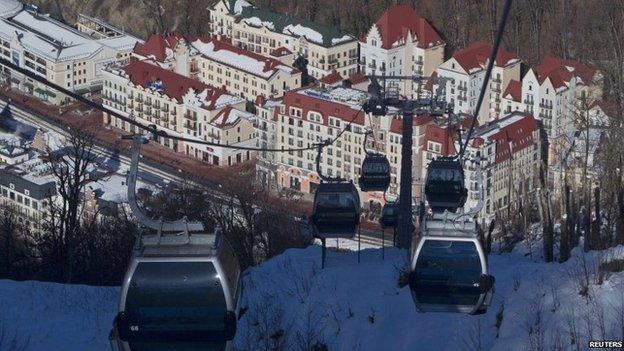Winter Olympics: Russia to allow protests in special zone
- Published

A tight security regime will be in force throughout the Games which take place in February
The Russian authorities are to set up a special zone for protest rallies at the Sochi Winter Olympics, where security will be tight.
A special security regime will be in place in and around the southern city from 7 January until 21 March.
The authorities announced last year that a ban on rallies would be imposed in the Games area.
But a decree now says protests during the Games in February can be held if agreed with the authorities.
Presidential spokesman Dmitry Peskov said all public gatherings and demonstrations must be agreed in advance with the municipal authorities as well as regional divisions of the interior ministry and the Federal Security Service, the FSB.
"The president has issued an instruction to the organisers of the Olympic Games, together with the leadership of Krasnodar Territory and the Sochi mayor's office, to select a venue in the city where rallies, demonstrations and other events, including, if necessary, protests, could be freely held," Mr Peskov said.
But limits can be placed on the number of people taking part in demonstrations, according to the presidential decree.
Protests groups, such as those campaigning for gay rights and political reform, had complained at the restrictions on the right to stage demonstrations at the Games.
Security concerns
Security has been a major concern in the run-up to the event, with fears of attack by militant groups.
Two suicide bomb attacks killed 34 people in the southern city of Volgograd on 29 and 30 December. Russian investigators say the perpetrators are believed to be two men who arrived in the city from the restive North Caucasus region.
The bombings prompted President Vladimir Putin to order further security measures and personally inspect Olympic sites.
Security measures in Sochi are reported to include surveillance by drones and strict limits on road access to the city.
Some analysts see the easing of restrictions on demonstrations as the latest in a series of moves to burnish Russia's image and counter the Kremlin's critics as the Games approach.
A recent amnesty saw the release from prison of two members of the female punk group Pussy Riot, and Greenpeace activists held over a protest against Arctic oil drilling.
In a separate move, President Putin pardoned former oil tycoon Mikhail Khodorkovsky, once Russia's richest man, on humanitarian grounds. He was freed after more than 10 years in prison.
The Chinese authorities imposed similar restrictions on protests for the 2008 Beijing Olympic Games.
Demonstrations were permitted in three designated city parks but permission had to be obtained from the city authorities and the police.
- Published30 December 2013
- Published2 January 2014
- Published10 May 2012
- Published28 October 2013